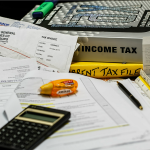 What are dividends?
What are dividends?
Dividends are another way of taking money out of your company (the other ways you can take money out of the company are: salary, reimbursement of expenses and a company loan).
Who can receive a dividend?
Dividends are paid to the owners of the company, the shareholders, in proportion to the number of shares that are owned. If you own all the shares in the company then you will receive all the dividend income. If you own 75% of the shares and your spouse or business partner owns the other 25% then you will receive 3/4 of the dividend and your partner will receive a 1/4.
How much can you pay as a dividend?
Dividends are paid out of the profits after tax of the company. You should not take out more dividends than the profits of the company as this will be in breach of the Companies Act 2006.
How do I pay a dividend?
You will need:
- to calculate the profits after tax of the company;
- a board (or shareholders) meeting to declare the dividend;
- a dividend voucher issued by the company to the shareholders as evidence of the dividend for your (or their) personnal self-assessment tax return;
- to transfer the funds to the shareholders.
How often can I pay a dividend?
You can pay a dividend as often as you like providing the company has the profits available; so you could pay a dividend monthly (and this will probably help you meet your personal cashflow requirements).
How are dividends taxed?
Dividends form part of your income and therefore they should be included in your Self-assessment Tax Return. If you are a basic rate taxpayer you will have no further tax to pay on the dividend income. If you are a 40% taxpayer you will pay a further 32.5% tax on the income.
The company will pay no tax or national insurance on the dividend.
If you need any assistance in preparing the profit after tax calculation or drafting the meeting minutes or dividend voucher then please contact your accountant or Clearways Accountants on 01737 244298.
